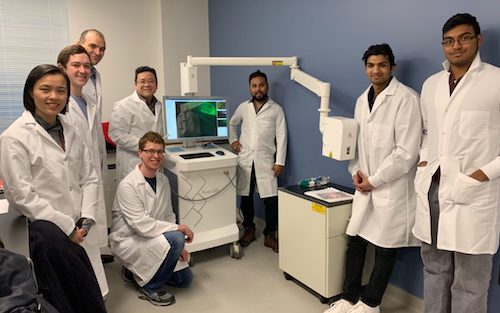
July 14, 2022 – An innovative camera technology, inspired by the mantis shrimp’s visual system, has the potential to transform intraoperative surgical procedures for cancer patients, allowing clinicians to receive more information during biopsies and detection procedures.
Developed by Cancer Center at Illinois (CCIL) scientists Viktor Gruev and Shuming Nie, this promising discovery recently led to a $9M P01 award from the National Cancer Institute, to be used over five years, in which researchers at the University of Pennsylvania, Purdue University, and Johnson & Johnson are also Principal Investigators (PIs) on the grant providing innovations that synergize with the camera technology and leading clinical trials with lung cancer patients at Penn Medicine.
Over the past decade, Gruev has been collaborating with Illinois colleagues across disciplines to re-create the mantis shrimp’s complex visual system in a single device that would provide doctors with a multi-spectral view – allowing surgeons to see exactly where the tumor is located. This technology serves multiple purposes, offering surgeons better images during a biopsy and when performing an endoscopy, a procedure in which a camera-like instrument is inserted into the body to better detect diseases like cancer.
This P01 award will allow Penn Medicine doctors to utilize the Illinois technology when conducting bronchoscopies on patients to detect and diagnose lung cancer.
In addition to the camera advancement, the UIUC team is wielding augmented reality to further improve the information received by surgeons. Gruev’s lab has created goggles that will provide 3D visualization to doctors during surgery.
The success of the camera in previous clinical trials has opened the door for additional future partnerships. The Illinois team is working with grant co-PI Timothy Fan, CCIL research program leader and Illinois professor of veterinary clinical medicine, to establish clinical trials with animal patients.
